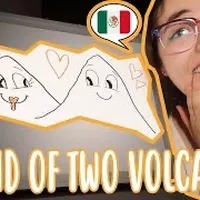En México existen muchas historias y cuentos, pero la favorita es la historia del volcán de Popocatépetl e Iztaccíhuatl. Hola chicos, yo soy Andrea y hoy les voy a contar una historia. Esta historia dice así, hace mucho tiempo existía un rey muy rico, tenía mucho dinero y era rey, rey de un castillo, ¿ok? Ese rey tenía una hija, aquí. La hija se llamaba Iztaccíhuatl, es un nombre extraño, difícil de pronunciar, pero la hija se llamaba Iztaccíhuatl. Esta hija estaba enamorada, estaba enamorada de un guerrero. ¿Era un guerrero? De un guerrero, un guerrero valiente y muy fuerte, fuerza. Ella se enamoró de él y los dos se enamoraron, mucho amor, ¿ok? Los dos se enamoraron. El rey les dijo "ok, ok, perfecto, súper bien". Le dijo sí a que estuvieran juntos, los dos. El rey dijo sí, me gusta la pareja, pero, pero ellos dos querían casarse. Querían casarse en matrimonio, un anillo, ¿ok? En la mano, el anillo. Querían casarse y el rey les dijo sí, sí se pueden casar.
Pero, ¿qué creen que pasó? Pues había muchas peleas en esa época, en ese tiempo, y entonces el rey le dijo a Popocatépetl, era su nombre, le dijo "tienes que ir a la guerra a pelear, tienes que ir a pelear contra el otro pueblo, tienes que ir a pelear". Y él le dijo sí, ok. Entonces el padre, el rey de Iztaccíhuatl, le dijo al guerrero que se fuera a pelear, a pelear, que se fuera a pelear contra el otro pueblo, que se fuera a pelear. Y mandó el jefe, el rey, a muchos soldados, muchos soldados del reino, del castillo, del castillo, para proteger el castillo de... ¡pum, pum, pum! ¡Guerras! ¿Ok?
Entonces Popocatépetl, él se fue con todos a pelear contra otro pueblo, otro castillo, ¿sí? Antes de decir "¡adiós, adiós! ", él, Popocatépetl, le dijo a la princesa, le dijo que cuando él regresara de la guerra, ellos se iban a casar, se iban a casar. Y él se fue a pelear y ella dijo "¡Bye, bye! ¡Adiós!"
Entonces, ¿qué creen? Popocatépetl ganó, ganó la batalla. Ganó. Y entonces en el castillo, aquí, la princesa... La princesa estaba triste porque Popocatépetl no había regresado al castillo. No había regresado y se sintió triste. Pobrecita. Entonces alguien, otra persona, una persona fue al castillo, fue al castillo y le dijo al rey y a la princesa Iztaccíhuatl que él, que Popocatépetl, había muerto. Que él había muerto. Pero no era verdad. Él estaba vivo. Entonces la princesa Iztaccíhuatl se puso muy triste porque pensó, pensó que su amado, su amado había muerto. Y entonces la princesa no comió. Entonces la princesa estaba muy triste porque pensó que él había muerto. Y entonces, porque estaba muy triste, muy triste, lloraba mucho, ella, la princesa, no comió. La princesa no comió comida y entonces se puso flaquita. ¿Qué creen? Como la princesa no comió, se murió. Murió la princesa por no comer y por tristeza. Entonces la princesa estaba muerta. La princesa estaba muerta.
Y entonces Popocatépetl regresó al castillo. Él regresó al castillo y le dijo, le dijo al rey, le dijo que había ganado. ¡Ganó victoria! Ganó. Ganó la batalla. Pero el rey le dijo a Popocatépetl que la princesa Iztaccíhuatl había muerto. ¡No! Popocatépetl fue rápido con la princesa muerta y la llevó. Los dos. Popocatépetl cargó, cargó a la princesa y se fue. Se fue. Él tomó en sus manos, en su mano, una antorcha con fuego. Y él, Popocatépetl, se fue. Se fue. Lejos. El rey no sabía dónde estaba la princesa, la princesa y Popocatépetl. Y Popocatépetl no sabía.
Después de mucho tiempo, las personas del castillo, las personas del castillo dijeron... Ellas vieron con sus ojos, ellas vieron con sus ojos que dos, uno, dos, que dos montañas, volcanes, habían salido, ha aparecido magia. ¡Pum! ¡Pum! Habían aparecido dos volcanes así, como magia. ¡Tarán! Entonces el rey, el rey del castillo dijo... Él dijo, ellos dos son Iztaccíhuatl y Popocatépetl porque murieron juntos. Los dos, los dos murieron juntos. Y ellos dos, los volcanes, eran Popocatépetl e Iztaccíhuatl. Ellos dos se quedaron juntos y murieron juntos, juntos, y salieron y se convirtieron... ¡Pah! ¡Tarán! En dos volcanes enamorados.
Entonces la historia nos dice que ellos dos, Popocatépetl e Iztaccíhuatl, se quedaron juntos... ¡Para siempre, para siempre! Para siempre, por amor. ¡Ah! ¡Ah! Y ellos se quedaron juntos. A la princesa, la princesa Iztaccíhuatl le dijeron "la mujer", la mujer... ¡Shhh! ¡Shhh! Dormida. La mujer dormida. ¡Shhh! ¡Shhh! La mujer dormida. Y al Popocatépetl le dijeron "el volcán que humea", que sacaba humo. El Popocatépetl. Entonces las personas dicen que cuando el volcán Popocatépetl humea, ¡Shhh! Saca humo, es porque piensa en su amada, en Iztaccíhuatl. Él piensa en Iztaccíhuatl.
Bueno chicos, esta fue la historia y la leyenda del Popocatépetl e Iztaccíhuatl. ¿Ustedes conocen otra historia? No se olviden en darle like al canal, en comentar si ustedes conocen otra historia, si les gustó, y por favor, la campanita, ¡ding dong, ring! de las notificaciones para que ustedes puedan ver más videos. Una vez más, su mexicana habló con ustedes y nos vemos hasta la próxima. ¡Ahhh! Bye, bye.

